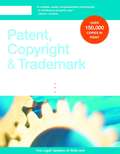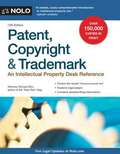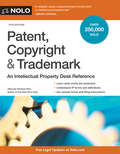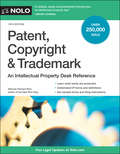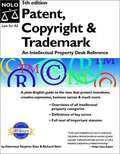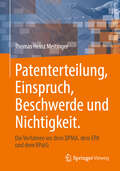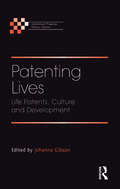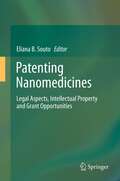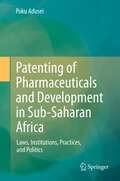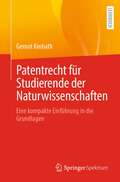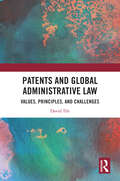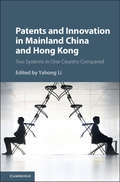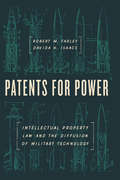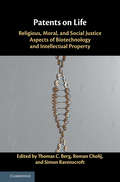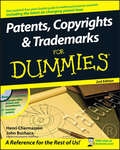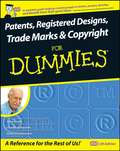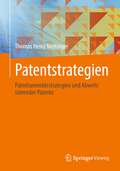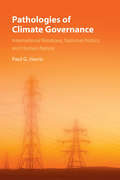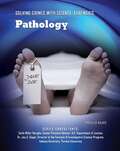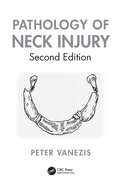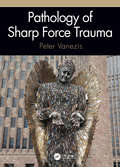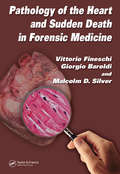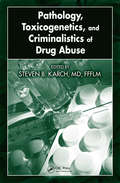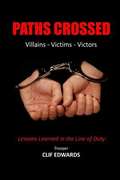- Table View
- List View
Patent, Copyright & Trademark
by Richard StimWhether you're an inventor, designer, writer or programmer, you need to understand the language of intellectual property law. Otherwise, you can't intelligently deal with intellectual property issues such as: . who owns creative works or valuable information . how owners can protect and enforce their ownership rights . how disputes between intellectual property owners can be resolved, and . how ownership rights can best be transferred to others. With Patent, Copyright & Trademark, you will: . get clear overviews of relevant laws . understand the different kinds of protection offered by patents, copyrights, trademarks and trade secrets -- and which apply to your work . get a plain-English definition of every term you're likely to come across, and . find the information you need, quickly and easily -- all entries are organized by topic and extensively cross-referenced. This edition has been updated to reflect the latest changes in intellectual property law and provides the latest U.S. Patent and Trademark Office rules and forms. It includes up-to-date discussions of the new "first to file" rule, which promises to revolutionize patent law. Plus, read all new Q&As excerpted from author Richard Stim's popular blog, Dear Rich.
Patent, Copyright & Trademark
by Richard Stim AttorneyWhether you're investigating patent, copyright or trademark law, get the most concise and comprehensive explanations of intellectual property in one volume! Whether you're an Edison, Faulkner or Jobs, you need Patent, Copyright & Trademark. Intellectual property law has rapidly produced its own language. But don't count on understanding it right off the bat -- the terms baffle lawyers and lay folk alike. Whether you're an inventor, designer, writer or programmer, you need to understand the language of intellectual property law to intelligently deal with such issues as: who owns creative works or valuable information how these owners can protect and enforce their ownership rights how disputes between intellectual property owners can be resolved, and how ownership rights can best be transferred to others. With this essential guide, you will: get clear overviews of relevant laws understand the different kinds of protection offered by patents, copyrights, trademarks and trade secrets -- and which apply to your work get a plain-English definition of every term you're likely to come across, and find the information you need, quickly and easily -- all entries are organized by topic and extensively cross-referenced. The 12th edition has been thoroughly revised and updated with the most up-to-date case law and legislation on patents, copyrights, trademark and all other issues intellectual property. Plus, read all new Q&As excerpted from author Richard Stim's regularly updated blog, Dear Rich.
Patent, Copyright & Trademark: An Intellectual Property Desk Reference
by Richard StimA plain-English guide to intellectual property law Whether you are in the world of business or creative arts, you need to understand the laws that govern your work. But given the convoluted terminology that surrounds patents, copyrights, trademarks, and other intellectual property rights, this isn't easy. Enter, Patent, Copyright & Trademark, which explains: what legal rights apply to your work the scope of copyright protection an overview of trademark law, and what trade secret law protects. Here, you'll find plain-English definitions of intellectual property law terms, straightforward explanations of how intellectual property law affects online content, and much more. This edition is completely updated to provide the latest laws, court decisions, and sample forms.
Patent, Copyright & Trademark: An Intellectual Property Desk Reference
by Richard StimA plain-English guide to intellectual property law Whether you are in the world of business or creative arts, understanding the laws that govern your work is critical to success. But given the convoluted terminology that surrounds patents, copyrights, trademarks, and other intellectual property rights, this isn’t easy. Enter Patent, Copyright & Trademark, which explains: what legal rights apply to your creations, products, or inventions different types of patents for inventions from machines to plant clones the scope of copyright protection how trademark law works, and what trade-secret law protects. Here, you’ll find readily understandable definitions of intellectual property law terms, straightforward explanations of how intellectual property law affects online content, and much more. The 16th edition is completely updated to provide the latest laws, court decisions, and sample application and other forms.
Patent, Copyright and Trademark (5th edition)
by Richard Stim Stephen EliasThis work offers information in plain language on basics of intellectual property law and related legal terms. It explains how to protect intellectual property and how intellectual property law affects the Internet.
Patenterteilung, Einspruch, Beschwerde und Nichtigkeit.: Die Verfahren vor dem DPMA, dem EPA und dem BPatG
by Thomas Heinz MeitingerDieses Buch beschreibt das amtliche Patenterteilungsverfahren vor dem Deutschen Patent- und Markenamt und dem Europäischen Patentamt und gibt praktische Anleitungen, um eine zügige Patenterteilung zu erreichen. Gelingt die Patenterteilung nicht, kann der Zurückweisungsbeschluss des Patentamts durch eine sogenannte „Anmelderbeschwerde&“ angefochten werden. Ein bestehendes fremdes Patent kann innerhalb der Einspruchsfrist durch ein Einspruchsverfahren angegriffen werden. Nach Ablauf der Einspruchsfrist besteht die Möglichkeit der Nichtigerklärung des fremden Patents vor dem Bundespatentgericht. Vor dem Bundesgerichtshof in Karlsruhe finden die Nichtigkeitsberufungsverfahren statt. Außerdem gibt es noch amtliche Löschungsverfahren gegen Gebrauchsmuster, Marken und Designrechte. Alle diese Verfahren vor dem DPMA (Deutsches Patent- und Markenamt), dem EPA (Europäisches Patentamt), dem BPatG (Bundespatentgericht), dem BGH (Bundesgerichtshof), dem EUIPO (European Union Intellectual Property Office) und dem EPG (Einheitliches Patentgericht) werden in diesem Buch beschrieben.
Patenting Lives: Life Patents, Culture and Development (Intellectual Property, Theory, Culture)
by Johanna GibsonPatenting Lives includes contributions from various interests and perspectives, both in the context of current international developments in life patents and the global agenda of harmonization of international intellectual property. The book is divided into five sections reflecting the critical issues arising from patents and biotechnology - Context; Human Rights and Ethical Frameworks; Medicine and Public Health; Traditional Knowledge; and Agriculture. The international contributors from government, civil society, academia and the private sector provide diverse perspectives on life patents and the facilitation of social, cultural and economic development in the context of international principles of trade.
Patenting Nanomedicines
by Eliana B. Souto"Patenting Nanomedicines: Legal Aspects, Intellectual Property and Grant Opportunities" focusses on the fundamental aspects of Patenting Nanomedicines applied in different "Drug Delivery and Targeting Systems". The promoters of new findings in this field of research are numerous and spread worldwide; therefore, managing intellectual property portfolios, and the acquisition and exploitation of new knowledge face several contingency factors. Today, the scientific community is discussing issues of economic outcomes in the field of Nanomedicines. Major concerns include questions as to whether the research groups, academics, industry and other stakeholders should work in unison or independently, if innovation or adaptation of new technology should be prioritized, public versus private research funding, and safeguarding versus sharing knowledge. However, despite its increasing importance for humankind, it is a matter of concern as to whether technological development can really be stimulated by patent protection. An intellectual property strategy should aim to develop a qualitative patent portfolio for continuous learning. This book addresses questions of ethics, socio-political policies and regulatory aspects of novel Nanomedicine-based products which are currently under development for the diagnosis and treatment of different types of diseases. It is divided in two parts - Part I is composed of the first 3 chapters, which focus on the "fundamentals" of legal aspects, emerging threats, advantages and disadvantages of patenting Nanomedicines, whereas Part II collects 12 chapters discussing different types of Nanomedicine-based products, their potential marketing aspects and patent protection. Whenever applied, each chapter offers a list of patents, based on a specific application in drug delivery and targeting. An outstanding team of 53 authors have contributed to this book, which will be of interest to professionals from the field of patent examiners, academics, researchers and scientists, students and other practitioners.
Patenting of Pharmaceuticals and Development in Sub-Saharan Africa
by Poku AduseiThis book critically investigates the patent protection of medication in light of the threats posed by HIV/AIDS, malaria and tuberculosis epidemics to the citizens of countries in Sub-Saharan Africa (hereinafter "SSA" or "Africa"). The book outlines the systemic problems associated with the prevailing globalized patent regime and the regime's inability to promote access to life-saving medication at affordable prices in SSA. It argues that for pharmaceutical patents to retain their relevance in SSA countries, human development concepts must be integrated into global patent law- and policy-making. An integrative approach implies developing additional public health and human development exceptions/limitations to the exercise of patent rights with the goal of scaling up access to medication that can treat epidemics in SSA. By drawing on multiple perspectives of laws, institutions, practices, and politics, the book suggests that SSA countries adopt an evidence-based approach to implementing global patent standards in domestic jurisdictions. This evidence-based approach would include mechanisms like local need assessments and the use of empirical data to shape domestic patent law-making endeavors. The approach also implies revising patent rules and policies with a pro-poor and pro-health emphasis, so that medication will be more affordable and accessible to the citizens of SSA countries. It also suggests considering the opinions of individuals and pro-access institutions in enacting crucial pieces of health-related statutes in SSA countries. The approach in this book is sensitive to the public health needs of the citizens affected by epidemics and to the imperative of building local manufacturing facilities for pharmaceutical research and development in SSA.
Patentrecht für Studierende der Naturwissenschaften: Eine kompakte Einführung in die Grundlagen
by Gernot KrobathDieses Lehrbuch bietet einen kompakten Einstieg in das Patentrecht für Studierende der Naturwissenschaften. Es präsentiert das wesentliche Grundwissen zum deutschen und europäischen Patentrecht. Dabei vertieft sich das Buch bewusst nicht in selten auftretende Spezialfälle oder juristische Feinheiten, sondern es ermöglicht den Lesern, ein Grundverständnis für die zentralen Begriffe und Grundprinzipien des Patentrechts zu entwickeln. Das Lehrbuch enthält zahlreiche Kurzbeispiele und Fallfragen mit Lösungen, anhand derer der Leser die Inhalte verstehen und nachvollziehen kann.
Patents and Global Administrative Law: Values, Principles, and Challenges
by David TiltThe book applies values and concepts from Global Administrative Law (GAL) to international patent law, demonstrating how limiting technocratic and overly economic language can be. Highlighting the administrative foundations of patent law, the book argues that, in its international form, it can be analysed using the same principles of participation, transparency, and accountability found in national administrative law.At the heart of the book is a simple question: What does international patent law look like when we approach it through the lens of these values? What is being left out when patent law is described predominantly in terms of its technical legal provisions or economic impact? The book presents three interrelated contexts: EU patent law, bilateral trade agreements, and the multilateral space. Modern patent law is increasingly discussed in terms of national competitiveness or economic potential, which reveals only a narrow understanding of how patent law evolves and functions. The vocabulary of administrative law provides a fresh way of recasting, reframing, and re-describing the dynamics of international patent law in a way that is more accessible to those outside of a traditional patent scholarship audience. A fundamental objective of the book is to challenge the tendency towards technocratic isolation in patent law. The book uses accessible vocabulary and represents a new way of conceptualising and understanding how patent law develops on a global scale.The book will be of interest to researchers in the field of patent law, international law, and administrative law.
Patents and Innovation in China and Hong Kong: Two Systems in One Country Compared
by Yahong LiHow do patents affect innovation in Mainland China and Hong Kong? How can two patent systems operate within one country and how is innovation affected by the 'one country two systems' model? For the first time, this book links these challenging issues together and provides a comprehensive overview for government officials, law-makers, academics, law practitioners and students to understand the patent systems of Mainland China and Hong Kong. Themes examined include the interaction between the two distinctive patent regimes, the impact of patents on innovation in China's specific industries such as green tech, traditional Chinese medicines and telecommunications, the role of utility models in inflating low-quality patents and the application of good faith principle in enforcing FRAND in Mainland China, patent system reforms in Hong Kong, and the impact of these changes on innovation in the two vastly distinctive yet closely connected jurisdictions.
Patents for Power: Intellectual Property Law and the Diffusion of Military Technology
by Robert M. Farley Davida H. IsaacsIn an era when knowledge can travel with astonishing speed, the need for analysis of intellectual property (IP) law—and its focus on patents, trade secrets, trademarks, and issues of copyright—has never been greater. But as Robert M. Farley and Davida H. Isaacs stress in Patents for Power, we have long overlooked critical ties between IP law and one area of worldwide concern: military technology. This deft blend of case studies, theoretical analyses, and policy advice reveals the fundamental role of IP law in shaping how states create and transmit defense equipment and weaponry. The book probes two major issues: the effect of IP law on innovation itself and the effect of IP law on the international diffusion, or sharing, of technology. Discussing a range of inventions, from the AK-47 rifle to the B-29 Superfortress bomber to the MQ-1 Predator drone, the authors show how IP systems (or their lack) have impacted domestic and international relations across a number of countries, including the United States, Russia, China, and South Korea. The study finds, among other results, that while the open nature of the IP system may encourage industrial espionage like cyberwarfare, increased state uptake of IP law is helping to establish international standards for IP protection. This clear-eyed approach to law and national security is thus essential for anyone interested in history, political science, and legal studies.
Patents on Life: Religious, Moral, and Social Justice Aspects of Biotechnology and Intellectual Property
by Simon Ravenscroft Thomas C. Berg Roman CholijThis volume brings together a unique collection of legal, religious, ethical, and political perspectives to bear on debates concerning biotechnology patents, or 'patents on life'. The ever-increasing importance of biotechnologies has generated continual questions about how intellectual property law should treat such technologies, especially those raising ethical or social-justice concerns. Even after many years and court decisions, important contested issues remain concerning ownership of and rewards from biotechnology - from human genetic material to genetically engineered plants – and regarding the scope of moral or social-justice limitations on patents or licensing practices. This book explores a range of related issues, including questions concerning morality and patentability, biotechnology and human dignity, and what constitute fair rewards from genetic resources. It features high-level international, interfaith, and cross-disciplinary contributions from experts in law, religion, and ethics, including academics and practitioners, placing religious and secular perspectives into dialogue to examine the full implications of patenting life.
Patents, Copyrights & Trademarks For Dummies
by John Buchaca Henri J. CharmassonUseful tips and step-by-step guidance from filing to issue to licenseAcquire and protect your share of this major business assetWant to secure and exploit the intellectual property rights due you or your company? This easy-to-follow guide shows you how -- helping you to evaluate your idea's commercial potential, conduct patent and trademark searches, document the invention process, license your IP rights, and comply with international laws. Plus, you get detailed examples of each patent application type!Discover how to:Avoid application blundersRegister trademarks and copyrightsMeet patent requirementsNavigate complex legal issuesProtect your rights abroadThe entire body of U.S. patent lawsExample office actions and amendmentsSample formsTrademark registration certificatesApplication worksheetsSee the CD appendix for details and complete system requirements.Note: CD-ROM/DVD and other supplementary materials are not included as part of eBook file.
Patents, Registered Designs, Trade Marks and Copyright For Dummies
by John Grant Henri J. Charmasson Charlie AshworthDo you have a great idea for the next big thing, an eye-catching new corporate logo, or an exciting new business concept? Understand how to safeguard your ideas and creations with this expert guide to the fundamentals of intellectual property. Walking you step-by-step through the processes involved in protecting your great ideas, this book offers all the advice you need to ensure that you're the only one cashing in on your creativity and hard work.
Patentstrategien: Patentanmeldestrategien und Abwehr störender Patente
by Thomas Heinz MeitingerPatentstrategien können in Patentanmeldestrategien und Strategien zur Abwehr störender Patente unterteilt werden. In aller Regel werden Patente und nicht Patentanmeldungen als störend empfunden, da Patentanmeldungen im Gegensatz zu Patenten nicht durchgesetzt werden können bzw. da es noch überhaupt nicht bekannt ist, was überhaupt der Schutzbereich eines durchsetzungsfähigen Patents aus der Anmeldung sein wird. Der Schutzumfang wird erst durch die Patenterteilung bestimmt. Dann ist es möglich, dass der Schutzumfang der erteilten Anmeldung nicht mehr stört, da das eigene Produkt keine Patentverletzung darstellt. Außerdem ist es möglich, dass sich aus einer Patentanmeldung überhaupt kein Schutzbereich ergibt, da die Patentanmeldung zurückgewiesen wird. Eine Patentanmeldung ist eben ein noch ungeprüftes Schutzrecht. Ein eingetragenes Gebrauchsmuster ist ebenfalls ein ungeprüftes Schutzrecht, obwohl es als vollständig durchsetzbares Schutzrecht gilt. Dennoch wird es der Inhaber eines eingetragenen Gebrauchsmusters schwer haben, eine einstweilige Verfügung ohne vorherige mündliche Anhörung der Gegenseite zu erhalten. Die Chancen hierfür sind bei einem Patent deutlich besser.Der Anmelder einer Patentanmeldung wird sich spätestens kurz vor Ablauf des Prioritätsjahrs vor die Frage gestellt sehen, ob er Nachanmeldungen in ausländischen Ländern vornehmen soll. Hierbei ist es relevant, in welchen Ländern wichtige Märkte für ihn sind und in welchen Ländern die Wettbewerber ihre Produktionsanlagen haben. Außerdem benötigt der Anmelder Informationen, wie am effektivsten und am kostengünstigsten Nachanmeldungen vorzunehmen sind bzw. welche Patentanmeldestrategien angewandt werden können. Dieses Fachbuch gibt dem Leser die Informationen an die Hand, die geeignete Anmeldestrategie zu finden und störende Patente abzuwehren.
Paternalism Beyond Borders
by Barnett Michael N.Nearly all of those who want to make the world a better place are engaged in paternalism. This book asks how power is intertwined with practices of global compassion. It argues that the concept of paternalism illuminates how care and control are involved in the everyday practices of humanitarianism, human rights, development and other projects designed to improve the lives of others. The authors explore whether and how the paternalism of the nineteenth century differs from the paternalism of today, and offer a provocative look at the power in global ethics, raising the question of whether, when, and how paternalism can be justified.
Pathologies of Climate Governance: International Relations, National Politics and Human Nature
by Paul G. HarrisEarth's climate is in crisis. Climate governance has failed. This book diagnoses climate governance as if it were a sick patient, uncovering the fundamental factors causing the worsening climate crisis. It distils decades of global climate negotiations to reveal the features of international relations that are impeding climate action, and it identifies political obstacles to climate governance across a variety of countries in the Americas, Asia, and Europe. The psychosocial aspects of climate change are explored to show how human nature, overconsumption, and global capitalism conspire to stymy climate action. Remedies are suggested for how to overcome hurdles to effective climate governance internationally and nationally, with ideas provided for individuals to help them align their own interests with those of the global environment. Covering all of the major recent events in climate politics and governance, this is an accessible book for concerned readers who want to understand the climate crisis.
Pathology (Solving Crimes With Science: Forensics #12)
by Maryalice Walker"Real-life" crime dramas on television intrigue us with the details of postmortem examinations leading to the arrest of murder suspects--but how do forensic pathologists, the doctors who investigate unnatural deaths and chilling crime scenes, actually bring criminals to justice? The story lies in the body of evidence. Literally. The human body provides a wealth of scientific evidence that allows forensic pathology, or legal medicine, to help resolve criminal cases and convict even most elusive perpetrators. The human body records the story of a crime in the language of cuts, wounds, and bruises, and in the fingerprints and bloodstains. Forensic pathologists are trained to scrutinize and interpret this evidence in ways no other scientist can. Examining victims' remains from the outside in, forensic pathologists investigate every inch of the human landscape to discover when, how, and why the victim died. Sometimes, a time of death is all a jury needs to convict a suspect of murder, and forensic pathologists are experts at uncovering this crucial evidence. Visiting crime scenes, collecting bodies in the middle of the night, and excavating suspicious burial grounds are all in a day's work for the sake of bringing justice to victims who can no longer speak for themselves.
Pathology of Neck Injury
by Peter VanezisPathology of Neck Injury, Second Edition is a practical guide and reference to all pathological aspects of neck injury. It covers a broad spectrum of trauma to the neck region, reflecting the experiences of many distinguished pathologists and those of author, Peter Vanezis, who has more than 50 years of expertise in the field. This highly illustrated text begins by explaining the anatomy of the neck region as it relates to trauma investigation and the various techniques required for its examination. Coverage goes on to describe penetrating injuries, comprising mainly sharp force trauma and firearm injuries. Asphyxial and related deaths are subsequently discussed in a series of chapters, before the focus turns to the examination of blunt impact, non‑compressive injuries. Here special reference is made to their common occurrence in road traffic accidents. Finally, this book concludes with environmental, toxic, and iatrogenic causes of injury. Where appropriate, and especially with regard to penetrating and compressive modes of trauma, the interpretation of injuries and their differentiation into various categories such as homicide, suicide, or accident has been addressed. Pathology of Neck Injury, Second Edition is an essential guide for all those involved in the relevant specialties of pathology, surgery, and forensic medicine – particularly pathologists, both qualified and in training, but also to clinical forensic practitioners, trauma specialists, ENT surgeons, and general surgeons.
Pathology of Sharp Force Trauma
by Peter VanezisPathology of Sharp Force Trauma illustrates and details sharp force trauma as seen in forensic pathology case work as well as in the clinical setting, outlining how one informs the other in interpreting such trauma for medico-legal purposes. For the purposes of discussion, the author defines sharp force trauma as: "The application of force to produce an injury which results in a clear division or separation of the skin and underlying tissues". Sharp force trauma may be caused by all manner of implements with a sharp edge and/or pointed end, whether or not they have been produced for use as a weapon, and includes knives, broken glass, scissors and many others, to name but a few. Certain tools, such as axes or machetes, combine a sharp edge with heavy weight and produce injuries with both sharp and blunt impact elements. In many countries, with the exception of those where firearms are readily available, sharp force trauma—particularly the use of knives—is the most common method of homicide and a frequent source of morbidity seen in emergency departments. Also, there has recently been an alarming upsurge in the use of knives in gang-related assaults and in terrorist incidents. As such, the book takes a comprehensive approach in explaining the different aspects of such trauma, most importantly the manner in which the victim has died. This includes cases of homicide, suicide or accident, indicating the type of weapon responsible, explaining how it was used, and presenting other such information to the investigation of such cases. Features: • Includes over 400 full-color graphic and illustrative images throughout • Addresses all aspects of the investigation including trauma, crime scene findings, post-mortem examination, characteristics of injuries and categorization into homicide, suicide or accident • Covers the biomechanics of knife trauma and tool mark examination techniques to identify implements used • Illustrates penetrating injuries caused by pointed implements which have linear components, such as arrows, nails, spears, stakes and others • Details cutting, penetrating, and other sharp force injuries resulting from medical intervention in a healthcare environment, such as might occur during surgical procedures • Examines sharp injuries caused by domesticated and wild animals • Written by one of the premier forensic pathologists in the world with over 40 years of first-hand case experience Pathology of Sharp Force Trauma is the first substantive book published in English to look exclusively at this subject. Although primarily intended for pathologists and clinicians who are involved in the examination of such injuries in the post-mortem room or in a hospital environment, it will also be of interest to medical examiners, police and criminal investigators, attorneys and legal professionals, personnel in other forensic disciplines, and all doctors and medical students with an interested in trauma and its management.
Pathology of the Heart and Sudden Death in Forensic Medicine
by Vittorio Fineschi Giorgio Baroldi Malcolm D. SilverAddressing the pathology of the heart and cardiovascular system from a forensic perspective, Pathology of the Heart and Sudden Death in Forensic Investigations guides the pathologist toward the effective resolution of cases. It critically reviews pertinent facts by revisiting pathologic findings and comparing them to etiopathogenic hypotheses, prop
Pathology, Toxicogenetics, and Criminalistics of Drug Abuse
by Steven B. KarchBeginning with a definition and explanation of scheduling of controlled substances, Pathology, Toxicogenetics, and Criminalistics of Drug Abuse covers investigative methods for all illegal drugs and several legitimate pharmaceuticals that are used illicitly, including steroids. It covers the latest techniques used to analyze drugs in the forensic laboratory including physical characteristics and chemical confirmatory tests. It discusses new theories and findings in toxicogenetics, details pathologic changes in the body due to drug use, and examines specific effects on the heart, lung, and central nervous system. More that 70 tables and figures illustrate and complement the text and the information is supported by extensive references
Paths Crossed: Villains - Victims - Victors
by Clif Edwards"When I was only fifteen, a thirty-five year old Deputy Sheriff, married and the father of three daughters, was transporting inmates to a dentist when he was overpowered and killed by a prisoner, who then escaped. Thirteen years later, that murderer and my Paths Crossed. " ~ Clif Edwards Paths Crossed of Villains, Victims & Victors by Michigan State Police Detective Lieutenant Clif Edwards is a true dramatic narrative of everyday heroes and crime drama. It reveals a police officer's evolution from rookie to veteran and its impact, both professionally and personally. Told in a highly inspirational manner, appealing to the general public and its insight to a law enforcement career makes it suggested reading for all criminal justice students. Intended as the first in a trilogy, it is crafted in 76 chapters which follow an orderly theme. Every chapter stands alone as a short story coupled with lessons learned, although many are enriched by prior episodes. Chapters are accented with pictures, articles, documents and quotes. Intriguing, sometimes shocking and always inspiring, it is a must read for all served by law enforcement. These stories allow the reader to experience perseverance, mistake and sacrifice. Foremost, the stark, yet precious reality of law enforcement is made real.
